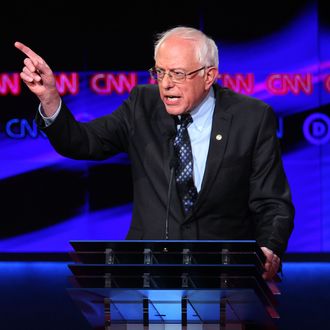
They don’t even call each other anymore. As the Democratic primary enters its final lap, Bernie Sanders and Hillary Clinton are drifting farther apart: When Clinton won Nevada back in February, Sanders called to congratulate her. After she won Arizona last week, he didn’t bother picking up the phone. Clinton, who tipped her cap to Sanders after his victory in New Hampshire, chose not to ring the senator after his trio of victories this weekend.
Okay, so the “drama” in the Democratic primary doesn’t hold a candle to the GOP’s Jerry Springer meets Triumph of the Will freakshow. Nonetheless, things are getting tense. Over the weekend, the Washington Post reported that Sanders was looking to “sharpen attacks” on Clinton ahead of New York’s April primary. Meanwhile, Politico noted that the campaigns had grown more bitter, suspending the little niceties, like congratulatory phone calls, which form the foundation for an eventual reconciliation. On Monday, the rival campaigns turned the race’s bitterness up to 11 (on a scale from 0 to 20).
First, Sanders campaign senior adviser Tad Devine called Clinton a “weak front-runner.”
“She’s emerged as a weak front-runner, her grasp now on the nomination is almost entirely on the basis of victories in states where Bernie did not compete,” Devine told reporters in a conference call. “Those eight states where we didn’t compete principally on ‘Super Tuesday’ resulted in almost all of her pledged delegate advantage right now.”
Devine’s claim is basically right, so long as you ignore that:
1. Sanders campaigned in many of the eight states he lost on Super Tuesday.
2. Hillary Clinton won Ohio, Illinois, Missouri, Nevada, North Carolina, Florida, etc., etc. …
The Clinton campaign, along with most of the political press, chose not to ignore those facts.
“I seem to recall them campaigning quite a bit in Texas, I seem to recall them campaigning quite a bit in South Carolina,” senior Clinton strategist Joel Benenson said in a separate conference call.
Meanwhile, Sanders’s pollster Ben Tulchin explained that superdelegates would soon join the political revolution en masse, because of the mounting evidence that the Vermont senator is a superior general election candidate. “Bernie is seen as uniquely honest and trustworthy among all the presidential candidates, particularly compared to Trump and Clinton,” Tulchin told Business Insider. “If you look at all three candidates — Bernie, Trump, and Hillary Clinton — Bernie is seen as very much honest and trustworthy by voters, while Trump and Clinton are not seen as trustworthy.”
The Clinton campaign was not pleased with its candidate being likened to a misogynistic pseudo-fascist.
“This is a man who said he’d never run a negative ad ever. He’s now running them. They’re planning to run more,” Benenson told CNN. When asked about Sanders’s request for a debate ahead of New York’s primary, Benenson adopted the attitude of a parent whose child has just asked to eat ice-cream before dinner. “Let’s see if he goes back to the kind of tone he said he was going to set early on. If he does that, then we’ll talk about debates,” he said.
Benenson went on to tell reporters that Bernie Sanders would “campaign like a Brooklynite” in New York, while Hillary Clinton would “campaign like a senator.” In context, Benenson was merely highlighting each candidate’s ties to the region – Sanders from his childhood borough, Clinton from her time in public office. But amid all the criticism over campaign tactics, initial reports of Benenson’s quote were widely interpreted as an insult against Sanders and the good people of Kings County. It also launched a thousand hipster jokes.
It’s true that Sanders’s campaign has grown more confrontational in recent days, even as Clinton has been striking a conciliatory tone. But this disparity says less about the nature of each campaign than it does about the state of the race. At this point, Clinton needs only 43 percent of the remaining pledged delegates to go into the convention with a majority. Even if she fails to hit that mark, so long as she keeps her superdelegates from jumping ship, she’d still secure the nomination by winning (roughly) a third of the remaining vote. At this point, alienating Sanders’s supporters is a far greater risk to Clinton than losing the nomination. Thus, a nice, polite little race is in her interest.
Sanders, by contrast, needs to engineer a historic come-from-behind victory in the state that Clinton served as senator for eight years. There is simply no way to close a double-digit deficit without attacking the front-runner.
Still, over the weekend Sanders reminded supporters that it’s “absolutely imperative” to keep a Republican out of the Oval Office. Eventually, the party will unify; Bernie and Hillary will kiss and make-up — but not before polls close in the Empire State.






























